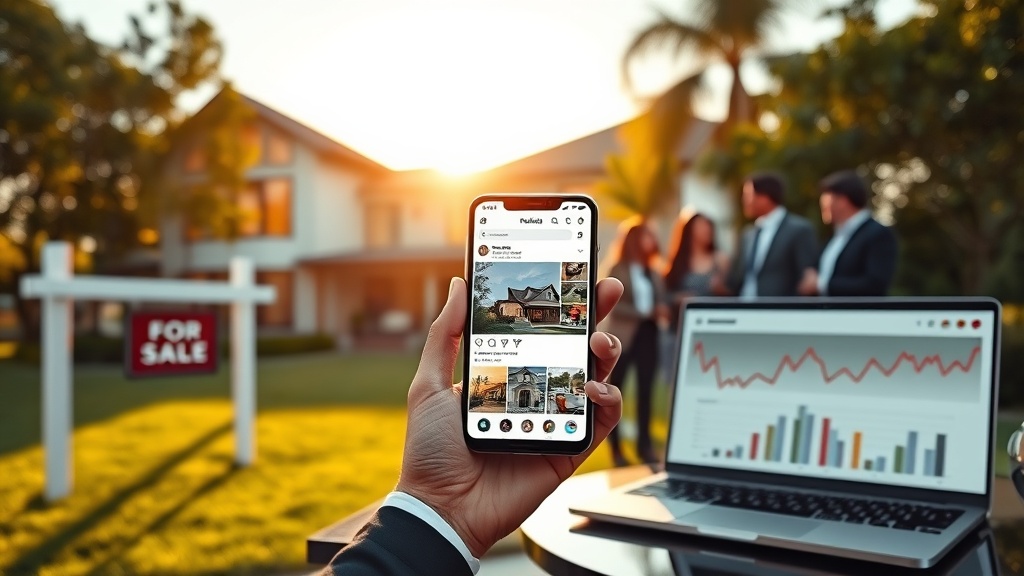The Power of Instagram and Facebook in Real Estate Marketing

" "
In today's digital age, the landscape of real estate marketing has been transformed by social media platforms, particularly Instagram and Facebook. These platforms have become essential tools for real estate professionals to reach potential buyers, showcase properties, and build their brand. This blog post delves into the power of Instagram and Facebook in real estate marketing, exploring historical contexts, current trends, and future implications.
Historical Context: The Evolution of Real Estate Marketing
Traditionally, real estate marketing relied heavily on print advertising, open houses, and word-of-mouth referrals. Newspapers and magazines were the primary mediums through which agents showcased properties. However, as technology advanced and the internet became ubiquitous, the marketing strategies in real estate evolved significantly.
The early 2000s saw real estate websites becoming popular, providing listings and virtual tours. This shift was monumental, as it allowed potential buyers to peruse multiple properties from the comfort of their homes.
The rise of social media in the late 2000s further revolutionized the industry. Platforms like Facebook, which launched in 2004, and Instagram, which followed in 2010, opened new avenues for engagement and interaction.
The Role of Instagram in Real Estate Marketing
Visual Storytelling
Instagram, being a visually-driven platform, is perfect for the real estate industry. Properties are inherently visual products, and Instagram allows agents to showcase them in stunning ways.
High-quality images: Agents can post high-resolution photos of properties, highlighting unique features and design elements. A picture of a cozy fireplace, a luxurious kitchen, or a serene backyard can capture a potential buyer's imagination.
Short videos and reels: These can offer virtual tours, showing the flow of a home and its ambiance, which static photos might not fully capture. A short video of a sun-drenched living room or a bustling neighborhood can make a property feel more tangible and relatable.
Engaging Content
Instagram's features enable real estate agents to create engaging and interactive content:
Stories and Highlights: These tools allow agents to share day-to-day activities, behind-the-scenes moments, and client testimonials, building a personal connection with their audience.
Live sessions: Agents can conduct live Q&A sessions or virtual open houses, offering real-time interaction with followers. This can be particularly effective in answering queries, providing immediate feedback, and creating a sense of urgency.
Building a Brand
Instagram is not just about showcasing properties; it's also a platform for personal branding. Real estate agents can use it to establish themselves as market experts:
Authenticity and personality: Sharing personal stories, professional milestones, and even failures can humanize an agent, making them more relatable to potential clients.
Networking opportunities: Engaging with other industry professionals or local businesses can lead to collaborations and referrals, expanding an agent’s network.
Real-World Example
Consider the case of a real estate agent in Los Angeles who uses Instagram to promote luxury homes. By focusing on high-quality images and utilizing Instagram Stories to provide market updates and tips for home buyers, the agent attracted a large following. This following translated into increased inquiries and, ultimately, sales. The agent's Instagram presence also positioned them as an expert in luxury real estate in Los Angeles.
Facebook: A Comprehensive Marketing Tool
Unlike Instagram, Facebook offers a more diverse set of tools and features that cater to a broader audience. Its versatility makes it an invaluable asset for real estate marketing.
Targeted Advertising
Facebook's advertising platform is one of the most robust available, allowing real estate professionals to target specific audiences with precision:
Demographic targeting: Ads can be tailored based on age, location, income level, and more, ensuring that marketing efforts reach those most likely to be interested.
Behavioral targeting: By analyzing user behavior and interests, Facebook can deliver ads to users who have shown prior interest in real estate, enhancing the likelihood of engagement.
Community Building
Facebook is not just for advertising; it's also a platform for building and nurturing a community:
Groups: Creating or participating in local community groups can help agents connect with potential buyers and sellers. These groups can also serve as platforms for discussing market trends and getting feedback from the community.
Events: Agents can create events for open houses or webinars, easily inviting potential clients and providing reminders to encourage attendance.
Content Diversification
Facebook supports a variety of content types, allowing agents to diversify their marketing strategies:
Long-form content: Posts can include detailed descriptions of a property's features, the neighborhood, and even personal anecdotes that paint a vivid picture for the reader.
Mixed media: Combining photos, videos, and text in a single post can provide a comprehensive overview of a property, appealing to different types of learners.
Real-World Example
A real estate firm specializing in first-time homebuyers leveraged Facebook's advertising tools to target young professionals in urban areas. By creating engaging video content and hosting virtual home-buying seminars through Facebook Events, the firm was able to generate a significant number of leads. The Facebook community they built also became a resource hub for potential buyers, fostering trust and credibility.
Current Trends in Social Media Real Estate Marketing
Social media is ever-evolving, and staying updated with current trends is crucial for real estate professionals:
Influencer Collaborations
Partnering with local influencers can amplify reach and credibility. Influencers with followers interested in home design, architecture, or local events can introduce properties to a broader audience.
User-Generated Content
Encouraging satisfied clients to share their experiences and tag the agent or agency can serve as powerful testimonials. This authentic content often resonates more with potential buyers than traditional advertising.
Virtual Reality Tours
As technology advances, virtual reality tours are becoming more common on social media. These immersive experiences allow potential buyers to explore properties as if they were there in person, all through their social media feeds.
Future Implications: What's Next?
The future of real estate marketing on social media is poised for exciting developments:
Integration of AI and Chatbots
As artificial intelligence continues to evolve, its integration into social media platforms could streamline interactions. Chatbots on Facebook, for instance, could handle initial inquiries or schedule viewings, allowing agents to focus on more complex tasks.
Enhanced Analytics
The ability to analyze engagement metrics in real-time will become increasingly sophisticated, enabling agents to refine their strategies and improve ROI on social media campaigns.
The Rise of New Platforms
While Instagram and Facebook are currently dominant, the ever-changing social media landscape means new platforms could emerge, offering innovative ways to connect with potential buyers.
Conclusion: A Balanced Perspective
While Instagram and Facebook provide powerful tools for real estate marketing, it's essential to use them strategically. Understanding each platform's strengths and tailoring content accordingly can significantly enhance marketing efforts. However, it's equally important not to become overly reliant on social media alone. Traditional methods, such as referrals and personal connections, still hold value and should complement digital strategies.
In conclusion, the integration of Instagram and Facebook into real estate marketing is not just a trend but a necessity in today's digital world. By harnessing the unique features of each platform, real estate professionals can effectively reach and engage with potential clients, ultimately driving success in their business endeavors. As technology continues to evolve, staying adaptable and open to new opportunities in social media marketing will be key to maintaining a competitive edge in the real estate industry.











